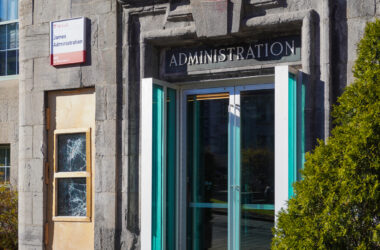Students may have seen the ‘No to Bill 21’ pins on various backpacks and jackets this semester, but they may not understand what the pins represent. Bill 21 is a law passed by the Coalition Avenir Québec (CAQ), which prohibits public sector employees from displaying religious symbols at work. The bill affects teachers, police officers, and lawyers employed by the province of Quebec.
The pins represent collaborative Montrealais and Quebecois efforts to speak out against the bill, which would prevent those who wear or carry religious symbols from finding employment in Quebec while also practicing their religion.The McGill contingent of this effort, McGill Against Bill 21, describes themselves as a space for students to come together, share articles, support each other, and plan actions against this bill.
McGill Against Bill 21 falls under the portfolio of Adam Gwiazda-Amsel, the Vice-President (VP) External for the Student Society of McGill University (SSMU). The McGill Tribune met with Gwiazda-Amsel to find out more about this campus-based initiative. Gwiazda-Amsel explained the importance of campus groups advocating on behalf of students affected by this legislation.
“We recognize that students don’t just exist as students. [They are] also racialized individuals, they have distinct realities outside of what’s referred to as ‘student issues,’” Gwiazda-Amsel said.
Because SSMU is mandated to act as a representative on behalf of the entire McGill undergraduate body, it also has the responsibility of advocating on behalf of its members affected by Bill 21.
“There’s the added aspect of education and law students not being able to find jobs in some of the professions that they’re preparing for,” Gwiazda-Amsel said. “[That’s] something that some of our members have displayed a unique concern about.”
When speaking to the goals of a group like McGill Against Bill 21, Gwiazda-Amsel explained that the organization supports students affected by the bill by existing and being a visible resource.
“Students that are being targeted [can] feel more supported, which is a priority,” Gwiazda-Amsel said. “People are scared. McGill against Bill 21 starts this conversation on campus.”
The group doesn’t only serve as a resource for those who face barriers to employment— it also seeks to engage other students in concrete action against the legislation. For students looking to get involved, Gwiazda-Amsel shared the current plans for the initiative moving forward.
“[There will be a demonstration] in front of the premier François Legault’s Montreal office, at 5:00 pm on Dec. 4,” Gwiazda-Amsel said.
While SSMU is doing valuable work to bring awareness and organization to this issue, there are a variety of other student and non-student organizations on campus that are vocal in their opposition of this legislation.
The Education Undergraduate Society (EdUS) is one such group. The Tribune spoke with their Vice-President Internal, Courtney Murdoch, to find out more. Murdoch explained the obligation that these organizations have to their students.
“Undergraduate societies exist to benefit our students,” Murdoch said. “We also provide professional development opportunities […] [with] the goal of helping our students find jobs in which they can be successful after graduation. Bill 21 invalidates this effort and forces students who are part of a minority group to choose between their rights […] and their chance at finding a job.”
Murdoch also acknowledged how the bill not only affects Education students at McGill, but a variety of students across multiple faculties.
“This does include Education, but also includes Engineering, Medicine, Nursing, Physical and Occupational Therapy, Management, Social Work, and more,” Murdoch said. “Beyond the direct impact on careers, however, Bill 21 sends the message to all students at McGill who are part of a religious minority that they do not belong in this province. As a University, this is not something we can allow to happen.”
Like McGill Against Bill 21, the EdUS also seeks to support students who are impacted by this bill.
“EdUS and the Faculty of Education must stand against this bill and support our students,” Murdoch said.
“There is no doubt in our minds about it,” Murdoch said. “We will do everything in our power to be allies to our students impacted by this bill, and we hope to provide them with a platform to speak out and fight this bill should they so desire.”









